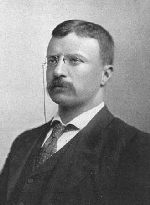
Teddy Roosevelt, Neil, p. 241.
Download an uncompressed TIFF (.tif) version of this image.
|
His fearless work as president of New York City's Board of Police Commissioners caught the attention of political associates of William McKinley. After his election as President, McKinley appointed Roosevelt assistant secretary of the navy in 1897. Much to Navy Secretary Long's chagrin, Roosevelt would make policy himself particularly when the secretary was out lunching. One such case involved the appointment and supply of Admiral Dewey's Asiatic Squadron with orders that they head for Manila harbor.
|
At the conclusion of the war, Roosevelt almost immediately was elected Governor of New York State. In order to get him out of New York, the head of the Republican machine there, Thomas C. Platt put him on the ticket as McKinley's running mate for the second term. They were elected, but on September 14, 1901 McKinley was assassinated and Roosevelt became the 26th President of the United States. He was one of the most activist presidents in U.S. history and is usually rated in the top five of those who have held that office. One of his greatest disappointments was President Woodrow Wilson's refusal to allow him to fight in World War I.
Roosevelt published a book titled The Rough Riders in 1899. The table of contents gives an idea of the topics he addressed relating to his experience and the experiences of the Rough Riders in the war.
Roosevelt, Theodore. The Rough Riders. New York: C. Scribner's Sons, 1899. LC Call Number: E725 .45 1st RI ; LCCN: 99-2686.
 Library of Congress
Library of Congress